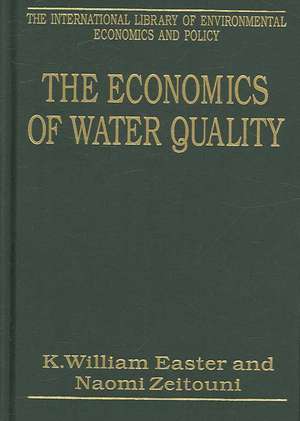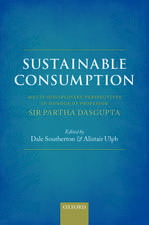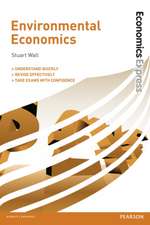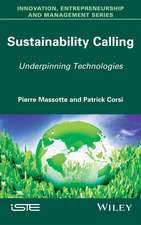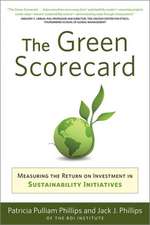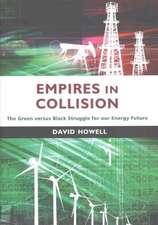The Economics of Water Quality: The International Library of Environmental Economics and Policy
Autor Naomi Zeitouni Editat de K. William Easteren Limba Engleză Hardback – 21 sep 2006
Preț: 1194.87 lei
Preț vechi: 1600.35 lei
-25% Nou
Puncte Express: 1792
Preț estimativ în valută:
228.67€ • 237.85$ • 188.78£
228.67€ • 237.85$ • 188.78£
Carte tipărită la comandă
Livrare economică 15-29 aprilie
Preluare comenzi: 021 569.72.76
Specificații
ISBN-13: 9780754623717
ISBN-10: 0754623718
Pagini: 620
Dimensiuni: 174 x 246 x 47 mm
Greutate: 1.18 kg
Ediția:1
Editura: Taylor & Francis
Colecția Routledge
Seria The International Library of Environmental Economics and Policy
Locul publicării:Oxford, United Kingdom
ISBN-10: 0754623718
Pagini: 620
Dimensiuni: 174 x 246 x 47 mm
Greutate: 1.18 kg
Ediția:1
Editura: Taylor & Francis
Colecția Routledge
Seria The International Library of Environmental Economics and Policy
Locul publicării:Oxford, United Kingdom
Cuprins
Contents: Series preface; Introduction. Part I Managing Alternative Sources of Water Pollution: Industrial Water Pollution: Environmental regulation, investment timing and technology choice, Wayne B. Gray and Ronald J Shadbegian; Industrial pollution in economic development: the environmental Kuznets curve revisited, Hemamala Hettige, Muthukumara Mani and David Wheeler ; The cost of water pollution regulation in the pulp and paper industry, John D. McClelland and John K. Horowitz. Agricultural Water Pollution: Dynamics of agricultural groundwater extraction, Petra Helleger, David Zilberman and Ekko van Ierland; Optimal self-protection from nitrate-contaminated groundwater, Richard C. Ready and Kimberly Henken;Economic risk and water quality protection in agriculture, Darrell J. Bosch and James W Pease; Endogenous transport coefficients, Anastasia M. Lintner and Alfons Weersink. Part II Alternative Instruments for Controlling Water Pollution: Regulation, Standards, Taxes, Subsidies and Liability for Water Quality: Agricultural runoff as a nonpoint externality: a theoretical development, Ronald C. Griffin and Daniel W Bromley; Agricultural pollution control under Spanish and European environmental policies, Yolanda Martinez and Jose Albiac; Land retirement as a tool for reducing agricultural nonpoint source pollution, Marc O. Ribaudo, C. Tim Osborn and Kazim Konyor; Modeling regional irrigation decisions and drainage pollution control, Ariel Dinar, Stephen A. Hatchett and Edna J. Loehman; Liability for groundwater contamination from pesticides, Kathleen Segerson. Water Pollution Permits and Nutrient Trading to Improve Water Quality: The structure and practice of water quality trading markets, Richard T. Woodward, Ronald A. Kaiser and Aaron-Marie B. Wicks; Transferable discharge permits and economic efficiency: the Fox river, William O'Neal, Martin David, Christina Moore and Erhard Joeres; Point-nonpoint nutrient trading in the Susquehanna river basin, Richard D. Horan, James S. Shortle and David G. Abler; Point/nonpoint reduction trading: an interpretive survey, David Letson; Point/nonpoint source trading of pollution abatement: choosing the right trading ratio, Arun S. Malik, David Letson and Stephen R. Crutchfield; A trading-ration system for trading water pollution discharge permits, Ming-Feng Hung and Diagee Shaw. Part III Returns from Clean Water: Provision of Clean water: The economics of safe drinking water, Robert Innes and Dennis Cory; Economic objectives within a bureaucratic decision process: setting pollution control requirements under the Clean Water Act, Arthur G. Fraas and Vincent G. Munley. Willingness to Pay to Prevent Water Pollution: Joint production and averting expenditure measures of willingness to pay: do water expenditures really measure avoidance costs?, Nii Adote Abrahams, Bryan J. Hubbell and Jeffrey L. Jordan; The economic benefits of surface water quality improvements in developing countries: a case study of Davao, Philippines, KyeongAe Choe, Dale Whittington and Donald T. Lauria; Contingent valuation in Korean environmental planning: a pilot application to the protection of drinking water in Seoul, Seung-Jun Kwak and Clifford S. Russell; Option prices of groundwater protection, Steven F. Edwards. Cost of Preventing Water Pollution: The on-farm costs of reducing groundwater pollution, Scott L. Johnson, Richard M. Adams and Gregory M. Perry ; Implications of alternative policies on nitrate contamination of groundwater, Manzoor E. Chowdhury and Ronald D. Lacewell; Optimal spatial management of agricultural pollution, John Braden, Gary V. Johnson, Aziz Bouzaher and David Miltz. Part IV Transboundary Water Pollution Control: Trade's dynamic solutions to transboundary pollution, Linda Fernandez; Transboundary water management: game-theoretic lessons for projects on the US-Mexico border, George B. Frisvold and Margriet F. Caswell; Does trade promote environmental coordination?, Hilary Sigman. Part V Trends and Emerging Issues in Controlling Water Pollution: Informal regulation of industrial pollution in developing countries: evidence from Indonesia, Sheoli Pargal and David Wheeler; Transaction costs of policies to reduce agricultural phosphorous pollution in the Minnesota river, Laura McCann and K. William Easter; Designing environmental regulations with empirical microparameter distribution: the case of seawater intrusion, Gareth P. Green and David L. Sunding; Groundwater management when water quality is endogenous, Catarina Roseta-Palma; Index.
Notă biografică
K. William Easter and Naomi Zeitouni are both based in the Department of Applied Economics at the University of Minnesota, USA.
Descriere
This volume brings together a number of prominent economic studies all of which deal with key water quality issues. The studies focus on the economic aspects of water quality including identifying the polluters' actions and incentives, designing and comparing control mechanisms, analyzing the costs and benefits of water quality programs, and finally managing transboundary water quality. They all make recommendations for improving water quality through changing incentives, programmes and/or policies.
